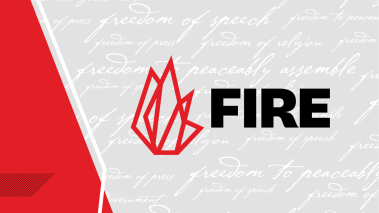Table of Contents
Fighting Words Overview

The First Amendment may protect profanity directed against another. Then again, such intemperate speech may fall into a narrow, traditionally unprotected category of expression known as “fighting words.” While many assume that cursing at a police officer would result in a disorderly conduct charge, that is not categorically so. Thus, in City of Houston v. Hill (1987), the Supreme Court emphasized that “the First Amendment protects a significant amount of verbal criticism and challenge directed at police officers.”
The Court developed the fighting words doctrine in Chaplinsky v. New Hampshire (1942), a case involving a Jehovah's Witness named Walter Chaplinsky, who upset other citizens after allegedly denouncing their religions as a “racket.” Citizens complained to authorities and Chaplinsky had a verbal confrontation with a city marshal, a man who once played semi-professional football.
The accounts differed, but the marshal’s version of events was that Chaplinsky cursed at the marshal, calling him a “God damned racketeer” and “a damned fascist.” The marshal arrested Chaplinsky for violating a state law prohibiting the utterance of offensive speech. The statute provided:
No person shall address any offensive, derisive or annoying word to any other person who is lawfully in any street or other public place, nor call him by any offensive or derisive name, nor make any noise or exclamation in his presence and hearing with intent to deride, offend or annoy him, or to prevent him from pursuing his lawful business or occupation.
On its face the law appears to be too broad and reached protected speech. However, the New Hampshire Supreme Court applied a narrowing construction, limiting its application to what it termed “fighting words.”
The Supreme Court agreed. It accepted this narrowing construction and the concept of fighting words. Justice Frank Murphy wrote for a unanimous Court:
It is well understood that the right of free speech is not absolute at all times and under all circumstances. There are certain well-defined and narrowly limited classes of speech, the prevention and punishment of which has never been thought to raise any Constitutional problem. These include the lewd and obscene, the profane, the libelous, and the insulting or “fighting” words — those which by their very utterance inflict injury or tend to incite an immediate breach of the peace.
Thus was born the fighting words doctrine. Justice Murphy explained that these fighting words were not protected because they did not contribute to the “exposition of ideas” and had little to no social value.
Limiting the Fighting Words Doctrine
Nearly three decades later, the Court limited the fighting words doctrine in Cohen v. California (1971). Officials charged Paul Robert Cohen with violating a California law prohibiting “maliciously and willfully disturbing the peace or quiet of any neighborhood or person by … offensive conduct.”
Cohen wore a jacket bearing the phrase “Fuck the Draft” into a Los Angeles county courthouse. He acted peacefully and removed the jacket once inside the courtroom. However, the message offended a police officer, who cited him for violating the breach of the peace law.
Cohen contended that he had a free-speech right to wear the jacket bearing a message of political speech. The state argued that Cohen’s jacket constituted fighting words under Chaplinsky. The Supreme Court disagreed. As the majority viewed it, the words on the jacket were not a “direct personal insult.” Moreover, no one reacted violently to the jacket.
In oft-cited language, Justice John Paul Harlan wrote:
For while the particular four-letter word being litigated here is perhaps more distasteful than most others of its genre, it is nevertheless often true that one man’s vulgarity is another’s lyric. Indeed, we think it is largely because governmental officials cannot make principled distinctions in this area that the Constitution leaves manners of taste and style so largely to the individual.
This ruling established that fighting words should be confined to direct personal insults.
A year after Cohen, the Court set aside the conviction of a defendant under a Georgia breach-of-the-peace law in Gooding v. Wilson. Johnny C. Wilson faced criminal charges after yelling at a police officer: “White son of a bitch, I’ll kill you,” and “You son of a bitch, I’ll choke you to death.” For these words, Wilson was arrested and convicted of disorderly conduct.
Officials charged Wilson under the following Georgia law (Georgia Code Ann. § 26-6303):
Any person who shall, without provocation, use to or of another, and in his presence[…]opprobrious words or abusive language, tending to cause a breach of the peace[…]shall be guilty of a misdemeanor.
The state argued the statute was constitutional because it only applied to “fighting words.” The Supreme Court reversed the conviction by a 5–2 vote (Justices Rehnquist and Powell did not participate). It ruled that the statute punished more than fighting words as defined under Chaplinsky.
In his majority opinion, Justice William Brennan explained, “[t]he dictionary definitions of ‘opprobrious’ and ‘abusive’ give them greater reach than ‘fighting’ words.” He also noted that Georgia courts had interpreted the statute to apply to more than fighting words.
The Court reached a similar result in 1974 in Lewis v. City of New Orleans by a 6–3 vote. Mallie Lewis was convicted under a city law which prohibited using “obscene or opprobrious language” to police officers. Lewis got into trouble after screaming obscenities at a police officer who asked her husband to produce his driver’s license.
Here again, Justice Brennan determined that the law violated the First Amendment because it was not confined to actual fighting words. He reasoned that “the proscription of the use of ‘opprobrious language,’ embraces words that do not ‘by their very utterance inflict injury or tend to incite an immediate breach of the peace.’” Brennan noted that that the Louisiana Supreme Court had failed to confine the statute to just fighting words, properly defined.
Many years later, the Supreme Court also rejected the idea that a Texas flag desecration law could be justified under the fighting words doctrine. In the 5–4 Texas v. Johnson (1989) decision, the Court majority emphasized that Gregory Lee Johnson did not engage in fighting words when he burned an American flag in connection with the Republican national convention in Dallas, Texas.
Texas officials contended that burning the flag was fighting words. But, Justice Brennan wrote that “[n]o reasonable onlooker would have regarded Johnson's generalized expression of dissatisfaction with the policies of the Federal Government as a direct personal insult or an invitation to exchange fisticuffs.”
In the 1992 cross-burning case of R.A.V. v. City of St. Paul, Justice Antonin Scalia addressed the fighting words doctrine. In his majority opinion, Scalia explained that a St. Paul, Minnesota ordinance selectively banning certain cross burnings ran afoul of the First Amendment. The city argued that the cross burning law was constitutional because it prohibited only fighting words.
Justice Scalia disagreed; he explained that the city ordinance amounted to viewpoint discrimination because it selectively targeted only certain cross-burnings and punished only particular forms of fighting words.
Doctrine Still Alive in the Lower Courts
While the Court has invalidated many convictions in fighting words cases, the doctrine remains alive and well in some state courts. Those courts routinely cite Chaplinsky in upholding disorderly conduct, breach of the peace, or harassment charges. Even so, the cases are all over the map as to whether an individual’s profane outbursts cross the line into unprotected fighting words.
One interesting pattern is that juvenile defendants fare worse in fighting words cases than adult defendants. Many juveniles have been held accountable for profane outbursts toward police officers, school teachers, or others.
When courts determine that an individual has uttered fighting words, they often will emphasize that individuals engaged in harassing conduct, waved their hands, spit at others, or some other form of unprotected conduct.
By contrast, when courts sustain a First Amendment defense, they focus solely on the speech and emphasize the fact that the First Amendment protects a great deal of offensive, obnoxious, profane, and repugnant speech.
Attempting to bring some clarity to this area of the law, in Purtell v. Mason (7th Cir., 2008) Judge Diane S. Sykes declared:
In law, ‘fighting words’ are abusive words or phrases
(1) directed at the person of the addressee,
(2) which by their very utterance inflict injury or tend to incite an immediate breach of the peace, that is, words that are likely to provoke a violent reaction, and
(3) play no role in the expression of ideas.
Nonetheless, confusion continues. On one hand, consider the following situations in which offensive statements were not fighting words:
- Calling a police officer a “son of a bitch” (Johnson v. Campbell, 3rd Circuit, 2003).
- Yelling “fuck you all” to a police officer and security personnel at a nightclub (Cornelius v. Brubaker, Minnesota District Court, 2003).
- Telling a police officer: “I’m tired of this God damned police sticking their nose in shit that doesn’t even involve them” (Brendle v. City of Houston, Court of Appeals of the State of Mississippi, 2000).
- Telling a security officer “This is bullshit” when rousted from a parking lot (U.S. v. McDermott, Eastern District of Pennsylvania, 1997).
On the other hand, consider the following cases in which other courts have determined that the expressions in the following situations were fighting words:
- Flashing a sexually suggestive sign repeatedly to a young woman driving a car (State v. Hubbard, Minnesota Court of Appeals, 2001).
- Yelling racial slurs at two African-American women (In re John M., Arizona Court of Appeals, 2001).
- Repeatedly yelling the words “whore,” “harlot” and “Jezebel” at a nude woman on the beach (Wisconsin v. Ovadal, Wisconsin Court of Appeals, 2003).
- Calling a police officer a “white, racist motherfucker” and wishing his mother would die (State v. Clay, Minnesota Court of Appeals, 1999).
- Calling a police officer a “fucking asshole” in a loud voice and attempting to spit on the officer (State v. York, Maine Supreme Judicial Court, 1999).
Not surprisingly, many scholars have questioned both the origins and logic of the fighting words doctrine. Temple University law professor Burton Caine, in an incisive 2004 article in the Marquette Law Review, called the Chaplinsky decision a “tragedy” for First Amendment law and the fighting words doctrine “ill-conceived”, “in disarray”, and “a potent danger to speech that should command premier protection.”
Additional Reading
Caine, Burton. “The Trouble with “Fighting Words”: Chaplinsky v. New Hampshire Is a Threat to First Amendment Values and Should Be Overruled.” Marquette Law Review 88 (2004): 441.
Greenawalt, Kent. Fighting Words: Individuals, Communities, and Liberties of Speech. Princeton, NJ: Princeton University Press (1995).
Hudson, David. “Curses! Blasphemy, Profanity Laws Still on the Books.” First Amendment Center (2009).
Hudson, David. “Fighting Words Case Still Making Waves on 70th Anniversary.” First Amendment Center (2012).
Hudson, David. “Paul Robert Cohen and ‘His’ Famous Free Speech Case.” Newseum Institute (2016).
Recent Articles
FIRE’s award-winning Newsdesk covers the free speech news you need to stay informed.

A third of Stanford students say using violence to silence speech can be acceptable

Stanford president and provost cheer free expression in open letter to incoming class

FIRE survey shows Judge Duncan shoutdown had ‘chilling effect’ on Stanford students
